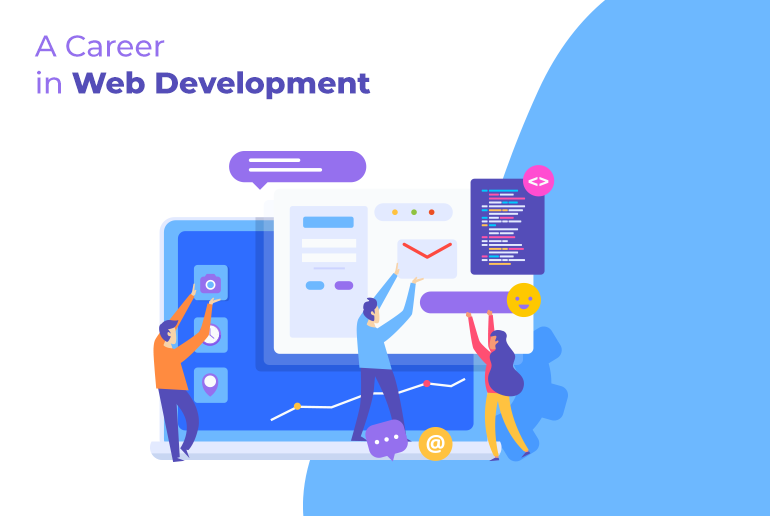Starting a web development career involves a series of steps that allow you to build the necessary skills, gain experience, and establish a professional presence in the industry. Here’s a comprehensive guide on how to begin your web development career:
1. Understand the Basics:
Start by familiarizing yourself with the fundamentals of web development. Learn about HTML (Hypertext Markup Language) for structuring web content and CSS (Cascading Style Sheets) for styling.
Gain a basic understanding of how web browsers work and how they render web pages.
Choose Your Path:
2. Web development has two primary paths:
- front-end
- back-end.
- Front-End Development: Focuses on creating the user interface and user experience. You’ll work with HTML, CSS, and JavaScript for interactive features.
- Back-End Development: Involves managing server-side logic, databases, and server infrastructure. Common back-end languages include JavaScript (Node.js), Python, Ruby, PHP, and Java.
3. Learn Programming Languages:
Depending on your chosen path, start learning the relevant programming languages.
For front-end development, JavaScript is essential. Familiarize yourself with libraries and frameworks like React, Angular, or Vue.js.
For back-end development, select a language like Node.js, Python (Django or Flask), Ruby on Rails, PHP, or Java.
4. Study Web Development Technologies and Tools:
Learn about web development tools, version control systems (e.g., Git), and integrated development environments (IDEs).
Explore text editors like Visual Studio Code, Sublime Text, or Atom.
5. Master Responsive Web Design:
Ensure your websites are responsive, meaning they adapt to different screen sizes (desktop, tablet, mobile).
Learn about media queries and mobile-first design principles.
6. Database Knowledge:
Understand the basics of databases, including SQL (Structured Query Language) for relational databases like MySQL or PostgreSQL and NoSQL databases like MongoDB.
7. Build Projects:
Hands-on practice is crucial. Start by creating small projects to apply your skills.
Build a personal portfolio website to showcase your work.
8. Online Courses and Tutorials:
Enroll in online web development course or tutorials on platforms like WsCube Tech, Coursera, edX, Udemy, and freeCodeCamp. These resources offer structured learning paths.
9. Books and Documentation:
Read books and documentation related to web development technologies and programming languages. High-quality resources can provide in-depth knowledge.
10. Practice Coding Daily:
Dedicate time to coding daily. Consistency is key to mastering web development.
11. Collaborate and Contribute:
Join open-source projects or collaborate with others on coding projects. This helps you learn from experienced developers and build a portfolio.
12. Networking:
Attend web development meetups, conferences, and online forums like Stack Overflow or GitHub to connect with others in the field.
13. Build an Online Presence:
Create profiles on professional networking sites like LinkedIn and GitHub to showcase your work and connect with potential employers or clients.
14. Freelancing or Internship:
Consider freelancing or applying for internships to gain practical experience and build your resume.
15. Create a Portfolio:
Showcase your projects, code samples, and skills in an online portfolio. Highlight your best work and provide detailed explanations of your contributions.
16. Job Search:
Start searching for web development job openings, both full-time and freelance. Tailor your resume and cover letter to match the job requirements.
17. Interview Preparation:
Prepare for technical interviews by practicing coding challenges and algorithm questions.
18. Continued Learning:
Web development is constantly evolving. Stay updated with new technologies and frameworks to remain competitive in the field.
Remember that the web development field is diverse, and specialization is common. You can choose to become a front-end developer, back-end developer, full-stack developer, or specialize in areas like web security, e-commerce, or mobile app development. Your journey in web development will be a continuous learning process, so stay curious and committed to improving your skills.

